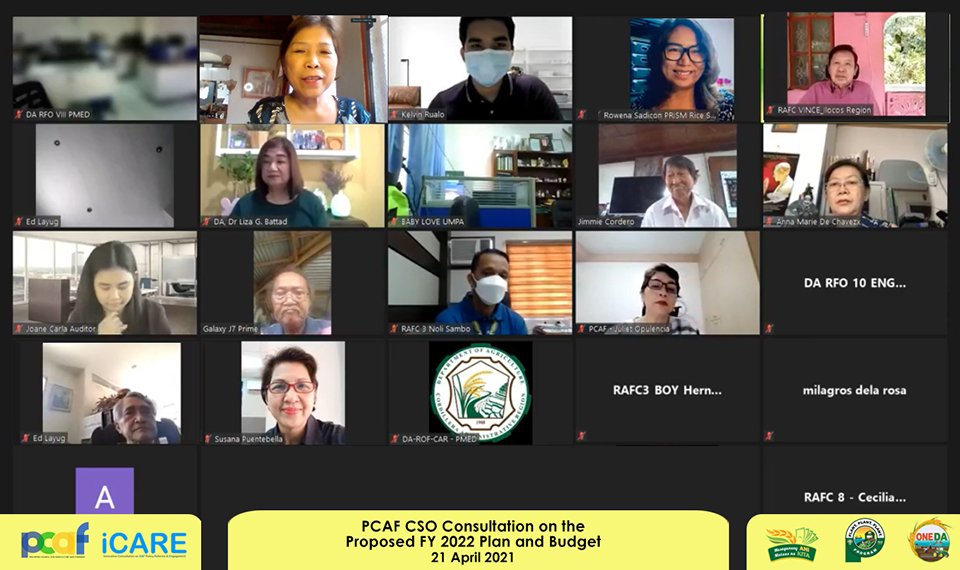
The Philippine Council for Agriculture and Fisheries (PCAF) presented the 2022 plan and budget proposal, a 69% increase over the 2021 enacted budget, to further strengthen the involvement of its private-sector partners in the realization of the Department of Agriculture’s (DA) Program, Activities and Programs (PAPs).
The proposal was presented by the agency to its partners, the Agricultural and Fishery Councils (AFCs) at the national and regional levels, during the online Civil Society Organization (CSO) consultation on Fiscal Year (FY) 2022 Plan and Budget Proposal on April 21, 2022.
The activity aims to generate greater appreciation among PCAF’s private sector-partners on the budget requirements of the agency’s planned activities and strategies for FY 2022, as well as to get suggestions on how to improve the proposed plan and budget of the agency.
Aside from the chairpersons of Regional AFCs and the National Banner Program Committees (NBPCs), also present were Regional Executive Officers, Regional Coordinators and key PCAF officials and staff.
“It is about time to help us defend and convince legislators that we need relevant funding to engage fully the AFCs, volunteers and industry players to support and implement the DA’s PAPs,” said PCAF Acting Executive Director Liza G. Battad to the agency’s private sector-partners.
The Executive Director also presented the agency’s goals and strategies, in line with PCAF Innovative Consultation for Agriculture and Fisheries Policy Reforms and Engagement or PCAF iCARE.
Included in the proposal were the agency’s planned activities and commitments towards the operationalization of OneDA framework through policy research and evaluative policy study.
Under the policy research, PCAF will shepherd the AFCs’ engagement on the State University and Colleges (SUC)-CSO co-implementation on the Research and Development policy action and strategies.
Exec. Dir. Battad mentioned the creation of SUC-hosted PCAF service hubs to “creatively” tap the expertise of the academe.
“It is fundamental that PCAF benefits from the mentoring culture of the academe. This will help us empower the AFCs because this is inherent to the universities and we have the right personnel and officials to work with. At the same time, (we want to) bring about the engagement of the Agricultural and Fishery Youth Council in policy development and improving the monitoring and evaluation (M&E), feedbacking system and into the R4D policy,” said Exec. Dir. Battad.
The policy research involves online opinion poll, enforcement of biosafety standards for livestock and other commodities of high export potential and border disease prevalence, M&E of DA’s Plant, Plant, Plant Program, effectiveness of regulation and monitoring of DA and its food safety regulatory agencies in the importation and exportation of agri and fishery products, and expanded crop insurance compendium package to farmers affected by recurrent disasters and calamities to sustain agriculture credit and financing towards food security.
For the evaluative policy study, PCAF also engage AFCs with third party and CSO co-implementation to review the Food Safety Act of 2013, review the National Livestock Genetic Improvement and its planned effects in sustainability of community livestock enterprises, and ex ante analysis of the Republic Act 7160 known as the Local Government Code of 1991 (Mandanas Ruling) effects on food security.
Through an improved budget, Exec. Dir. Battad also presented the agency’s commitment to enhance its agriculture and fishery stakeholders’ participation in policy development.
She also added that in 2022, PCAF will also focus in co-implementing agri-fisheries issues and concerns with good focus on Bantay ASF sa Barangay, Bantay Presyo, Bantay FAW and PAFES concerns.
As discussed over the consultation, the private sector-partners recommended the following to PCAF to consider in the 2022 plan and budget:
* To work on the implementation of the convergence of the AFCs and the Fisheries and Aquaculture Resources Management Councils.
* To provide status of utilization of the PL480-funded projects
* To strengthen monitoring and tracking of activities in coordination with NBPCs and AFCs specifically on the operational adoption of policies endorsed.
* To explore the possibility of providing communication expenses and other incentives for NBPCs and AFCs for the conduct of virtual meetings and consultations.
* To work on the bushels per acre with PhilMaize in coordination with the Philippine Carabao Center, National Dairy Authority, National Livestock Program on the utilization of corn silage.
* To set special consultation on the corn industry on the genetic improvement, post-harvest and insurance programs.
* To consolidate the policy researches and evaluative studies’ suggestions from the NPBCs and AFCs.
* To enhance the Information Communications Technology capacity specifically for the development of PCA’s industry desk dashboard
* To enhance participation for AFCs in the Agriculture Dialogues and Information Network Groups (ADING) by ensuring their involvement the post qualification or awarding of bids
* To work on the needed requirements for the implementation of Mandanas Ruling.
###JC











